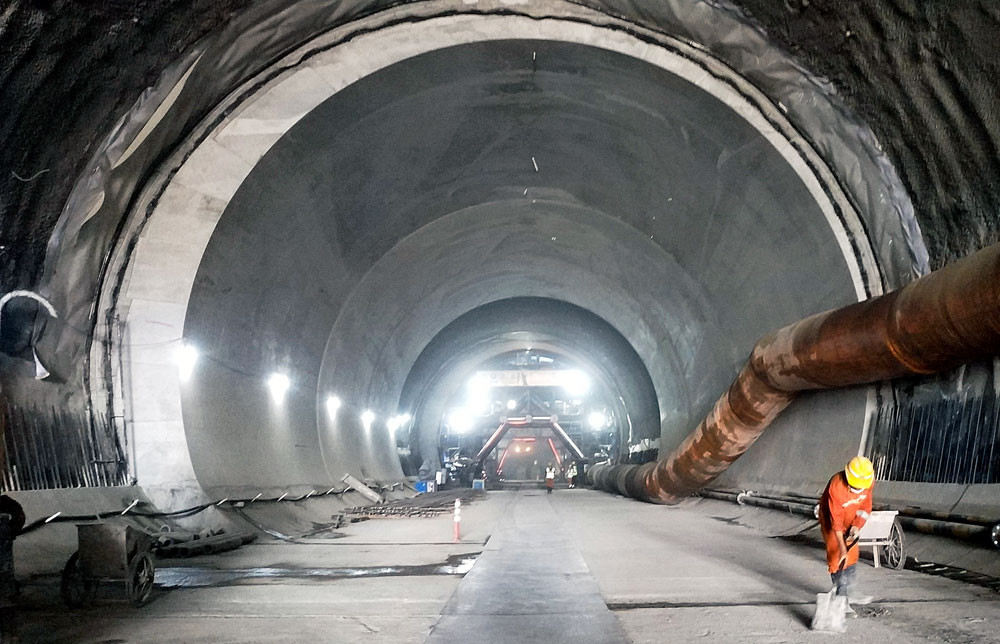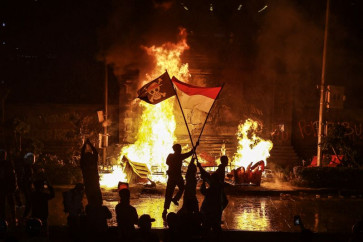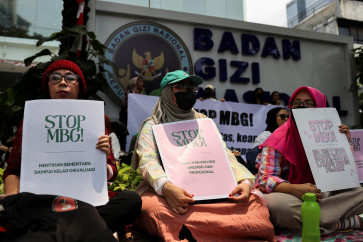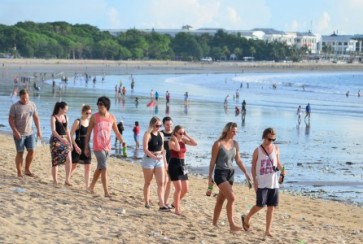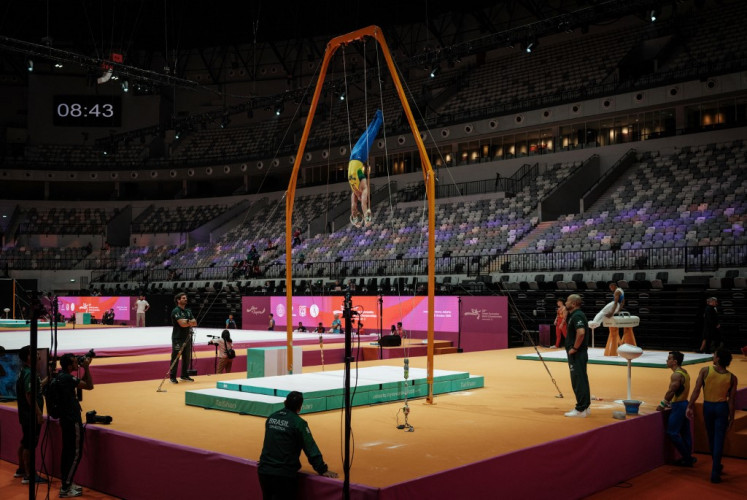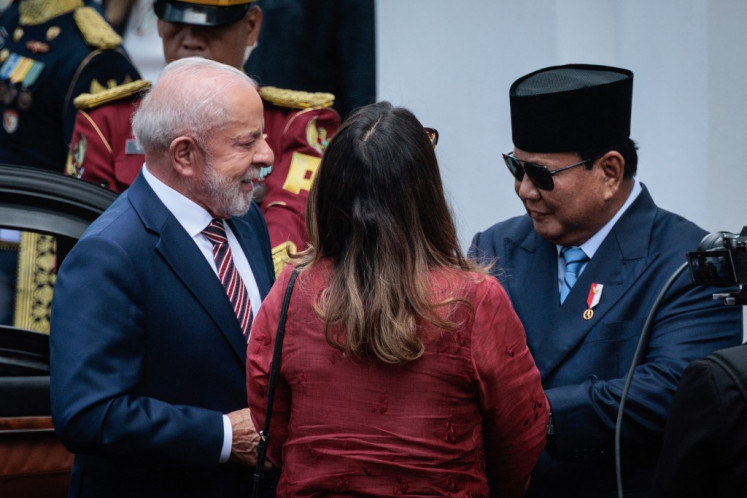Popular Reads
Top Results
Can't find what you're looking for?
View all search resultsPopular Reads
Top Results
Can't find what you're looking for?
View all search resultsJapan for Jakarta-Surabaya high-speed train project
Jakarta’s Mass Rapid Transport (MRT) is one of Japan’s landmark legacies in Indonesia. The project is a huge success not just in terms of technology, but also behavioral changes it has generated.
Change text size
Gift Premium Articles
to Anyone

When meeting with new Japanese Prime Minister Fumio Kishida during the Group of 20 summit on Oct. 30-31 in Rome, President Joko “Jokowi” Widodo will have a golden opportunity to win back the hearts of the Japanese people and to redirect bilateral relations with Japan.
Jokowi shocked Japan, including then prime minister Shinzo Abe, with his decision to award the Jakarta-Bandung high-speed train project to China in September 2015. At that time Japan was almost certain to win the contract and had even begun to project the extension of the rail track to Surabaya, the capital of East Java.
Japan offered to cover 75 percent of the cost in soft and long-term loans, an interest rate of just 0.1 percent and a borrowing term of 40 years, under a government-to-government scheme. Yet Jokowi insisted on a business-to-business scheme as he did not want to add burden to the state budget.
Japan’s rival China could accept the terms. However, it turned out later, the project was not purely a business-to-business affair. The government’s role was visible as a consortium of state-owned companies from China and Indonesia was awarded the contract.
As reported by The Jakarta Post, during a bilateral meeting on the sidelines of the East Asia Summit in Kuala Lumpur in November 2015, one month after the announcement of the tender winner of the railway project, Abe bluntly expressed his disappointment with Jokowi’s favoring of China, citing Japan’s superiority in terms of technology and financing. Abe emphasized the importance of “a relationship of trust and transparency in procedures” and called for “a shared understanding on these matters for future cooperation”.
Since then, Japan has become extra cautious in dealing with Jokowi’s commitments to bilateral cooperation. Diplomatically Japan is “traumatized” by the Indonesian government, although ties between the two countries remain strong and warm (at least on the surface).
Both Indonesia and Japan face a similar problem of “taking everything for granted”. Therefore, it will be beneficial for both sides if President Jokowi demonstrates his sincere intention to reinvigorate bilateral ties.
Jakarta’s Mass Rapid Transport (MRT) is one of Japan’s landmark legacies in Indonesia. The project is a huge success not just in terms of technology, but also behavioral changes it has generated. The MRT has introduced a new culture of transportation, including the cultures of queueing and managing trash.
Nearly seven years into his presidency, Jokowi has navigated the country closer to China – he prioritized diplomatic and economic relations with China and fostered personal relations with Chinese leader Xi Jinping. It was a major political shift. The two countries’ economic relations are intensifying and China is now becoming Indonesia’s most important trading and investing partner.
To win back Japan’s heart, I suggest President Jokowi tell the Japanese prime minister when they meet in Rome – seriously and not just as a matter of courtesy — that Indonesia wants Japanese companies to bid for the Jakarta-Surabaya high speed train project. Jokowi has already allowed the Indonesia-China consortium that now is constructing the Jakarta-Bandung railway to join the tender.
It is very natural that China is eyeing the Jakarta-Surabaya railway project. And they have the right to do so. But this time Indonesia should provide a more transparent and fair chance to Japan, as well as other international corporations.
For a huge project like the Jakarta-Surabaya railway to be sustainable, economic considerations – not just political factors or a mixture between political and economic factors – matter. We should learn from the Jakarta-Bandung railway project.
As the government has admitted, a poor feasibility study and lack of transparency from both sides greatly contributed to the issues in the project, which was supposed to be a model of bilateral cooperation between the two countries.
The 142.3 kilometer Jakarta-Bandung high-speed railway project missed its original target of completion in 2019. It is expected to be finished in 2022. The US$6.07 billion megaproject has reportedly been suffering from a 23 percent cost overrun. Members of the consortium from the Indonesian side are now facing financial difficulties, because according to the contract, Indonesia must cover 60 percent of the additional costs in line with its 60 percent share ownership.
Jokowi plans to take a test ride on the speedy train with President Xi Jinping late next year during his visit to Indonesia to attend the G20 summit, which will be chaired by the President.
After defeating three rivals, including the popular Taro Kono, in the Liberal Democratic Party (LDP) leadership race last week, today Kishida is slated to be sworn in as the new prime minister of Japan, replacing the unpopular Yoshihide Suga, who faltered despite his big success in hosting the Tokyo Olympics.
Kishida definitely needs a major diplomatic scoop, and Jokowi can provide it. Japan has always been one of Indonesia’s most important trading partners and sources of foreign direct investment for decades. Indonesia enjoys a very good relation with China. But we need more friends who have a proven track record in helping Indonesia.
Give Japan a fair opportunity to bid on the megaproject. It is natural that Kishida will not be too serious in responding to Jokowi’s offer, because another failure will be politically costly for the Japanese leader’s political future.
Bapak President, you need to offer something “serious and big” to PM Kishida when you meet him in Rome.
***
The writer is senior editor of The Jakarta Post

